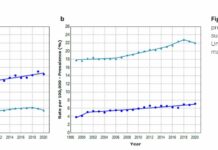Congressman David Jolly (FL-13) has recently introduced the Veteran Suicide Prevention Act (H.R. 4640). The bill calls for the VA to study veteran suicides over the past five years and to determine what extent psychiatric drugs are implicated in those suicides. The International Society of Ethical Psychology and Psychiatry (ISEPP) has long been concerned about this issue, and more broadly, how our veterans and military members suffering from the horrors of war and other traumatic experiences are being treated. I sent letters of support to Mr. Jolly’s office, offering ISEPP’s assistance in any way possible.
In 2012, ISEPP launched “Operation Speak Up” (OSU) as a response to the alarmingly high suicide rate of veterans. The name signifies our desire to help veterans speak up, rather than being shut up with psychiatric drugs. Although it started as an effort to encourage Congress to consider a non-medical model approach to helping those suffering from trauma, it quickly turned into a grassroots and consumer focused endeavor from the ground up under the leadership of our OSU Director, Mary Vieten, Ph.D., ABPP, U.S. Naval Reserve Commander. Mary has since made great strides in partnering with Melwood, Inc., a non-profit organization dedicated to helping people with disabilities in the greater Washington DC area. Together with Melwood’s support and funding, Mary has created a program called TOHIDU (a Cherokee word meaning “peace of mind, body, and spirit”) as a wonderful alternative to conventional treatment. You can see more about TOHIDU here.
Mr. Jolly’s bill will be the first to establish congressional oversight of this alarming problem of using psychiatric drugs shotgun style to quiet the screams of trauma. Despite the increasing concerns of the deleterious effects of psychiatric drugs, they continue to be the mainstay form of treatment within the VA and Defense Department, as they are on the outside. This has to change.The extant research makes it abundantly clear that psychiatric drugs do not correct chemical imbalances. It would be better said that they cause chemical imbalances. They artificially alter brain chemistry in ways that are not clearly understood, and that numb important emotions that signal meaningful issues in our lives. The brain tries to counteract their effect by making changes in how neurotransmitters are used. The person experiences these changes in very agonizing ways, the most worrisome is called “akathisia,” or a state of agitation, restlessness, and a terrible sense of not feeling welcome in one’s own skin. This can lead to unpredictable irritability and violent behavior, including violence toward oneself. To read more on this, see ISEPP’s White Paper.
Because of how the brain reacts to these drugs, trying to stop them becomes increasingly difficult and there are horrible withdrawal symptoms that can last for years. The more psychiatric drugs are used, the more they have to be used. They create disability and dependency, and they never address the meaningful nature of the person’s struggles.
The meaning of veterans’ reactions to war is quite simple; they are trying to find a way to integrate the incredible horrors they’ve witnessed and to find a way to come back into a society that cannot possibly fully understand them. Drugging them into a stupor is not the answer.
I encourage everyone to support Mr. Jolly’s bill by writing or calling your congressional representatives and encouraging them to cosponsor the bill. To do so, call 202-224-3121 and tell them your district or zip code, and you will be transferred to your representative’s office. To contact them by email, go to http://www.contactingthecongress.org.















This is of profound importance to the health and well-being of all veterans of combat, and for the health and peace of mind of all of their loved ones and families. Similar courageous political action, supported by an increasingly well informed and deeply concerned public is now required in the U.K.
Report comment
For Sure.
AKATHESIA: Or “Jumping out of your own skin” – can be comined with a mental state of extreme fear which most people describe as the worst experience of their lives. In this state a person could do literally anything.
Report comment
Trauma has been proven to shrink a portion of the brain(1) , resulting in various symptoms which can increase in severity over time. Therefor psychological trauma should be considered as evidence of a physical abnormality, or damage to the brain, and not the result of a chemical imbalance.
There are various proven non-drug therapies for treating trauma. The least expensive – and possibly the most effective of these are a series of simple Tension &Trauma Releasing Exercises. (2) This method should be taught during basic training in all military services – and practiced at least weekly in conflict areas to prevent service people from developing PTSD. It should also be widely available for any who have received significant psychological trauma regardless of the origins of the trauma.
1.Does Stress Damage the Brain, by J. Douglas Bremmer MD, Biologivcal Psychiatry 1999; 45:797-805; Traumatic Amnesia, Repression, and Hippocampus Injury due to Emotional Stress, Cortisosteroids and Enkephalins by R. Joseph,Ph.D. Child Psychiatry Hum Dev.1998Winter; 29(2):169-85 http://www.ncbi.nlm.nih.gov/pubmed/9816735
2. TheRevolutionary Trauma Release Process: Transcend Your ToughestTimes by David Berceli, PhD. http://www.traumaprevention.com
Report comment
I feel reluctant to suggest the use of nutrient therapy instead of drugs, because this gives officers a means of keeping their troops in the field longer and longer by making them less vulnerable to bio-physical stressors, but it works more slowly, but much better than drugs, if you individualize your treatments. As you’re dealing with military situations, perhaps you could use tai chi as a substitute for simple exercises.
Report comment
Agreed completely about Tai Chi, which works with CHI, the physical / electrical / muscle energy. Yoga works with “Prana”, which is breath energy. Doing BOTH Yoga and Tai Chi, even at basic, “introductory” levels, as simple physical exercise, can ONLY HELP. It’s a good thing, to see just how much the DoD has embraced Yoga, and the many benefits of Yoga. Even combat veterans are getting in on this. Thanks!
Report comment
All this is great news, and those involved seem to have a high degree of awareness of the issues. You never know where the chinks in the armor are going to appear, this time via the military. If these efforts succeed parallels can be drawn to similar issues, such as psych drugs and mass shootings.
Report comment
I am really hoping that this inquiry will open the door to other areas where similar damage is being done. It’s hard to miss that veterans’ issues are the direct result of being exposed to warfare and death on a daily basis. If the ineffectiveness and even dangerousness of using drugs to numb or dampen these effects in veterans is observed, it’s a short path to pointing out the same thing regarding the children, the elderly, and eventually the population in general. We should keep a close eye on this project and look for openings to expand the scope!
—- Steve
Report comment
Thanks, Steve! There’s an aspect to so-called “PTSD” that’s unique to combat Veterans, and that’s the idea of “moral injury”. Briefly, as I understand it, going in to combat, and coming back home, creates a special type of “cognitive dissonance”, which traditional psych drugs and diagnoses only make worse, and yes, DO cause suicides. I’ve really only seen it discussed on military-specific websites, but as an MiA author, maybe you’ve seen it, too. And, I’m so glad Chuck Ruby included the link to “Tohidu”. The few videos I saw today about Tohidu are VERY ENCOURAGING. I have several friends who are either Iraq, or Afghanistan Veterans, and yes, most traumatized Veterans are treated like dirt, by the “mental health” system, the VA included. Tohidu is VERY different, and I’d like to see MiA do a story on it. *hint-*-hint*…. 😉
Report comment
I do hope congress helps to end what some are now calling today’s psychiatric drug holocaust.
http://wearechange.org/medical-holocaust-psych-drugs-have-killed-more-than-5-million-people-over-the-last-10-years/
And I hope our government will actually stop advocating belief in, and funding research into, the scientifically invalid and unreliable DSM “bible” of psychiatric stigmatizations. And it is so sad more formerly healthy military personnel have now died from, likely psych drug induced, suicides, than have died from the war itself.
https://m.youtube.com/watch?v=sHC2wH_iGYM
It’s past due for our government to address today’s psycho / pharmacutical industries’ silent war against humanity.
Report comment
Someone Else,
Holocaust is exactly what it is, because of its calculation and scale.
Report comment
Thank you for bringing this important information to our attention Dr. Ruby.
Just wanted to add these resources into the mix:
http://www.truthout.org:80/hearing-debates-link-between-psychiatric-drugs-and-veterans-suicide57166
Dr. Breggin testifying about drug-induced adverse reactions and intoxication (toxic reactions to anti-depressants) misdiagnosed as mania hence bi-polar in PTSD and Brain injured vets.
drug-induced adverse reaction is included in the DSMV- but may not be properly utilized misdiagnosis allows for 2 important things to happen;
the person will most likely be drugged and become a life long consumer of the mental health system
the client may think they are mentally ill and may miss the fact that the drugs are making them sick,
http://breggin.com/index2.php?option=com_docman&task=doc_view&gid=239&Itemid=37
THE ATTORNEY’S GUIDE TO DEFENDING VETERANS IN CRIMINAL COURT
OVER-MEDICATION OF PTSD AND TBI PATIENTS
Dr. Peter Breggin, M.D.
Report comment
I’m dubious about the present Congress doing anything. After all, money is saved with suicide; Uncle Sam no longer has to pay for treatment, or a disability pension for the ailing vet. The Congressional majority is already outraged at having to recompense the casualties of an aggressive foreign policy, regarding them as softies and not fighters like belligerent politicians.
Report comment
What a sad truth you have stated. Suicide is the wish against ALL victims of all systems. They hand you the means by which to kill yourself, mentally torture you and then blame you if you survivor or perish.
My friend says “I will not give them the satisfaction of my suicide.” All victims know that they push for us to die.
Report comment
Perhaps if we asked Congress to stop war and instead advocate for world peace, this problem of drugging people–soldiers and civilians–for the post-effects of war trauma (in various forms) would take care of itself. As would so many other stressors that make life so chronically stressful for just about everyone concerned.
In how many ways can a person’s life be ruined by our current network of beliefs which are advocated by the norms of society? Society operates standardly in a way that makes people suffer.
Two choices: keep drugging, or change the beliefs and practices of society. These are polar opposites. There seems to be no middle ground, I can’t think of any other option at present.
Report comment
Perhaps if we asked Congress to stop war and instead advocate for world peace…
I take it this is irony?
Report comment
Ok!
Report comment
Encouraging alternatives to violence is necessary in our cultures. I’m guessing that we know only the tip of the iceberg about the US military’s use of prescribed drugs to enable soldiers to engage in and sustain warfare. Looking at non-drug alternatives for PTSD is imperative, and looking at what drugs have been used during fighting is also needed. We need a more full and honest picture of the impact on fighters as well as families of fighters and citizens funding war and the effects on observers and those we call enemies.
We all need to practice alternatives to violence, alternatives to violent means–drugging, unemployment/underemployment, meager opportunities that lead people to incarceration or military duty. Drugging children in daycare and elementary school for developmentally and contextually understandable behavior begins the pipeline.
Report comment